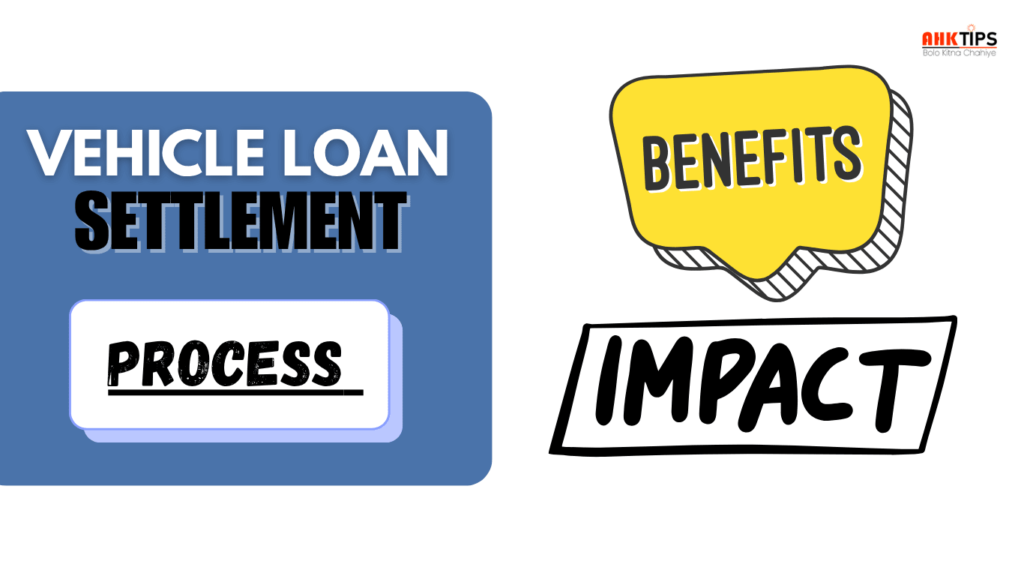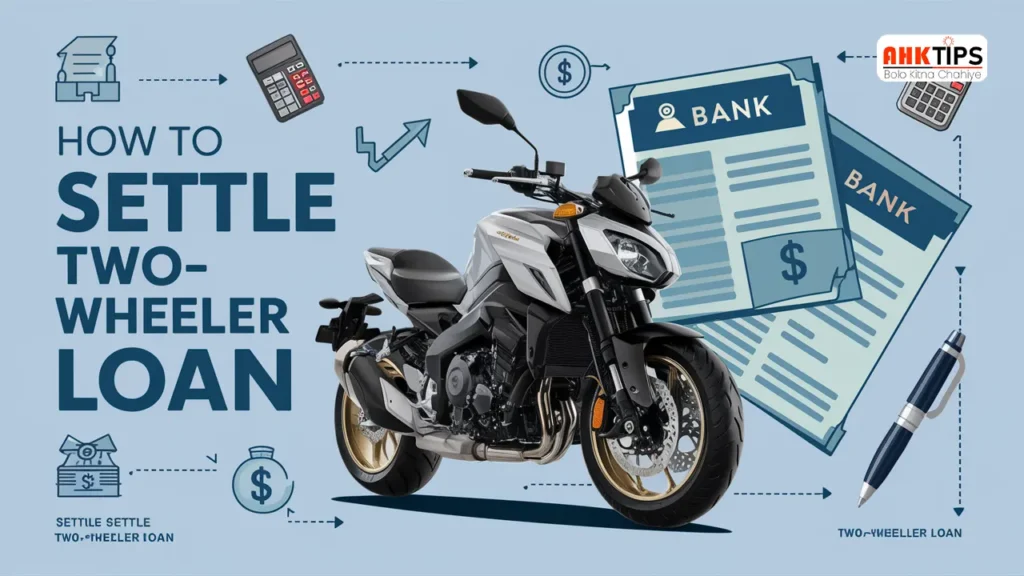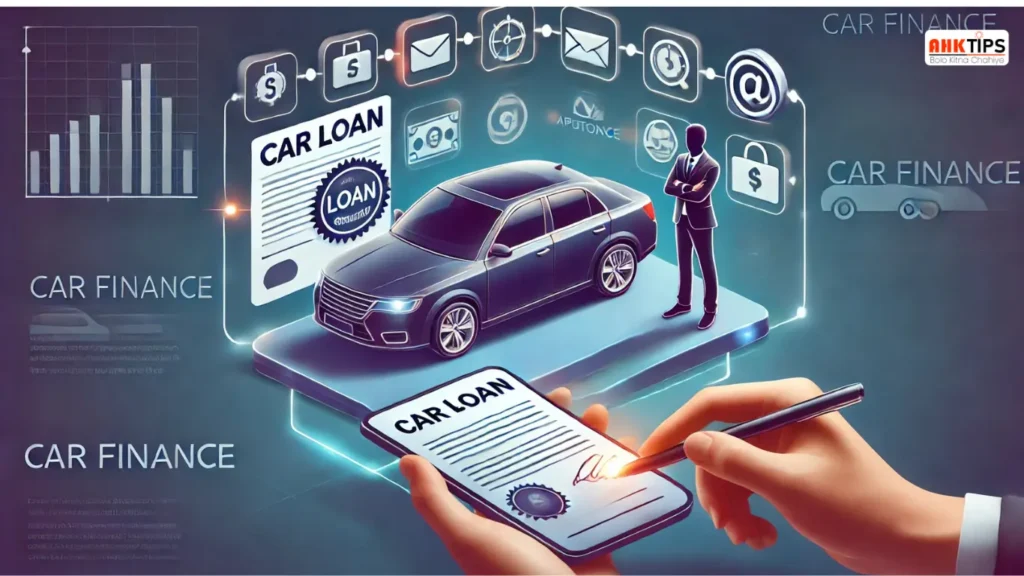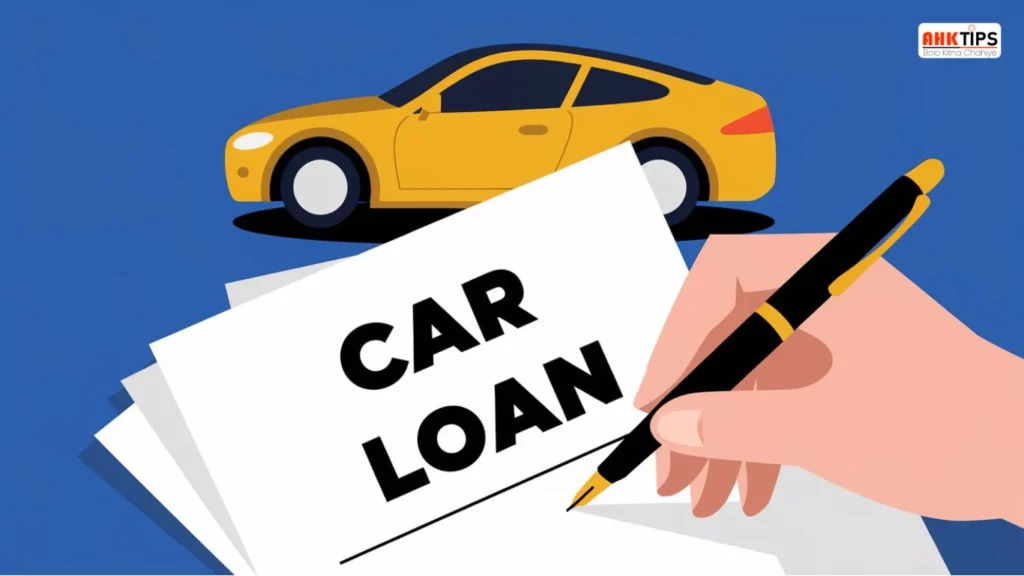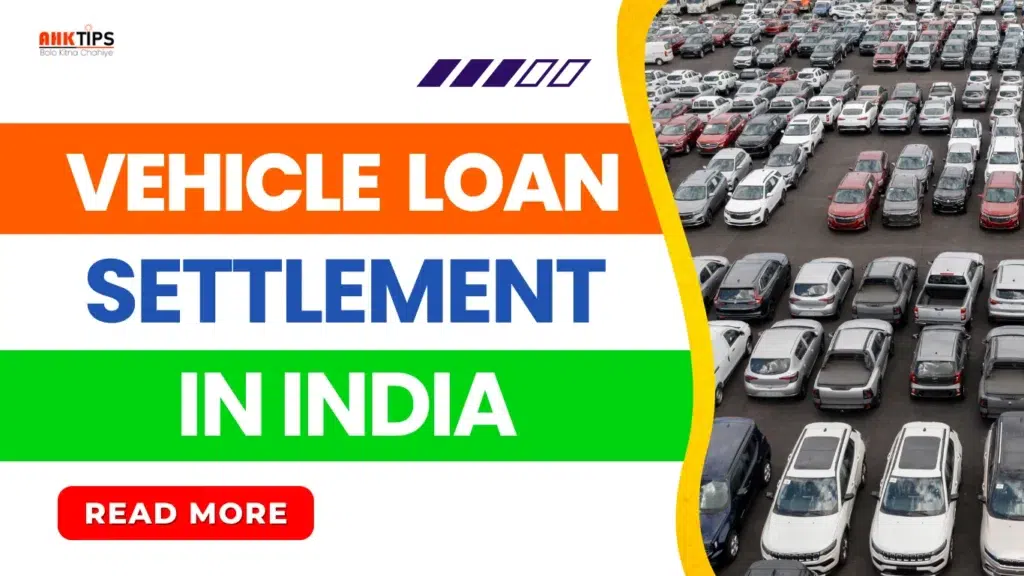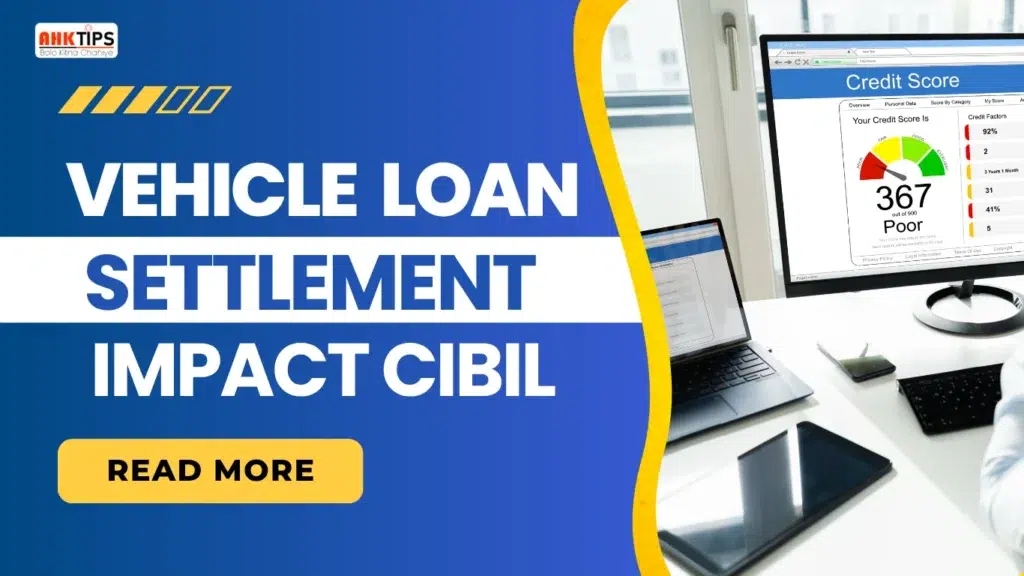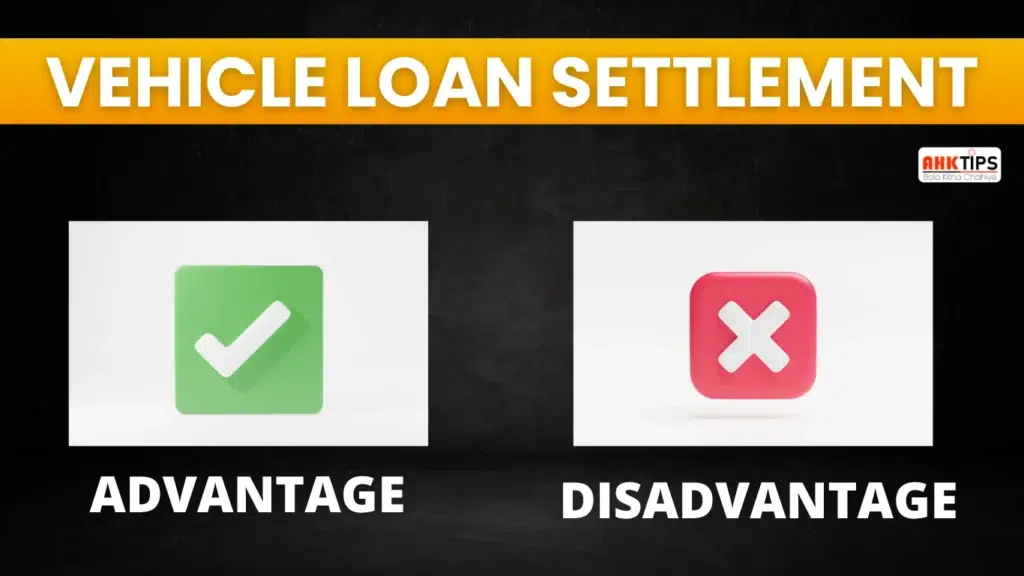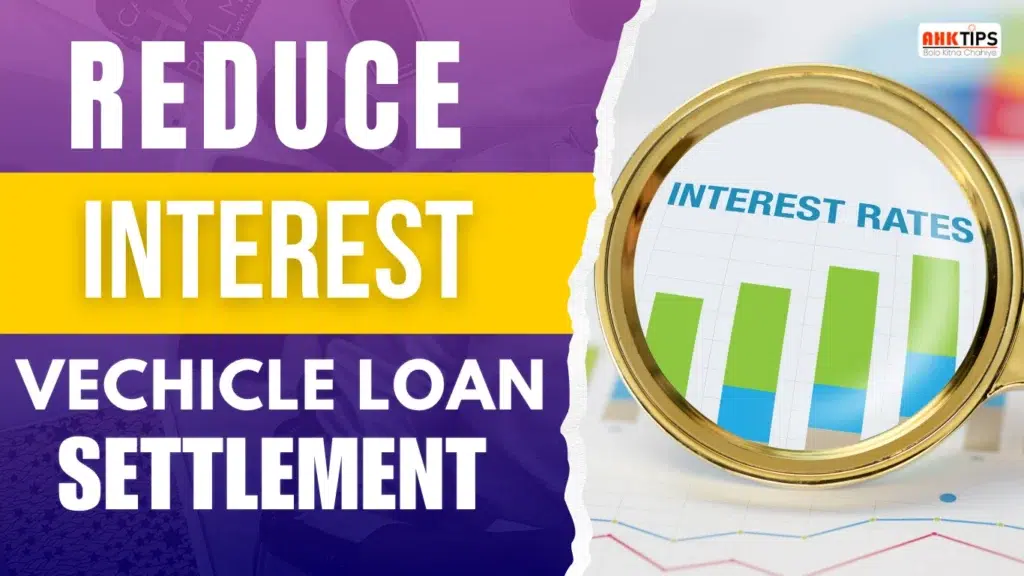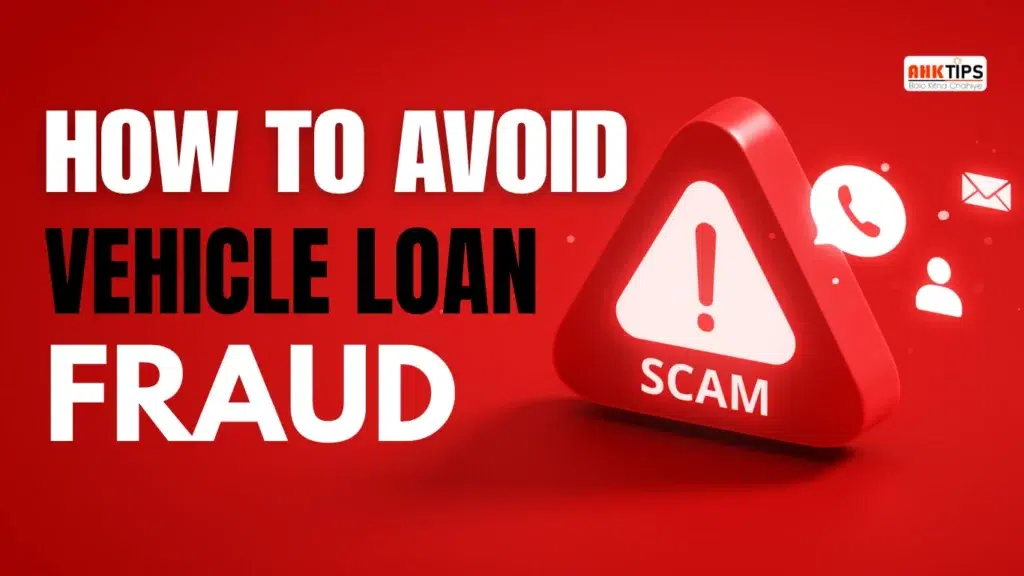Summary
Vehicle loan settlement is the process when, for certain financial reasons, the borrowers can’t repay their auto loan in full, so they reach out to the lender to close the auto loan and pay a lesser amount as a one-time payment. This is usually done in instances of default on the loan, job loss, or voluntary or involuntary repossession of the vehicle. The lender will write the loan off as “settled,” rather than “closed,” which will adversely affect your CIBIL score and your ability to borrow in the future. Vehicle loan settlements will include minutes to review your financial situation, the contact details for the bank, a vehicle loan settlement request, negotiation for the best settlement option possible, and release of funds for final payment. Vehicle loan settlement gives closure to your loan, some legal protection, and peace of mind; however, it still negatively affects your credit score and can stay on your credit report for up to 7 years.
Introduction
Settlement of vehicle loans is an option that lenders offer to customers when loan repayment is impossible or difficult to repay due to financial difficulty. For example, say you took a vehicle loan to buy a car or bike and find yourself in trouble because of a layoff, diminished income or medical emergency. Settlement gives you the ability to negotiate with the Bank to settle your loan. It allows you to settle your loan by paying a reduced lump sum payoff, which is less than the total outstanding amount. This is not an option for everyone, and while it allows for instant short-term relief, this is often seen as a last resort. Settlement will allow you to avoid repossession, court-ordered payments, etc. That’s why you must know when and why to settle and the impact it has on your CIBIL report for proper financial decision-making, especially in tough times.
Vehicle Loan Settlement Meaning
You agree to pay back the loan over a set period via monthly payments when you apply for a vehicle loan to purchase a bike or car. Still, life doesn’t always follow exactly what one expects. Financial difficulty, job loss, or personal events could make it impossible for you to keep making the repayments. Under such circumstances, vehicle loan settlement becomes available.
What is Vehicle Loan Settlement?
Settlement of a vehicle loan is an agreement between the borrower and the lender to close the loan account for a smaller amount than what is owing. Usually presented as a one-time settlement when the borrower is unable to keep fully repaying the loan, this is
The borrower pays the lump sum agreed upon after the lender agrees to “settle” the loan for a lesser sum. The lender notes the loan account as “settled” once paid instead of “closed,” or “paid in full.”
When is Vehicle Loan Settlement Used?
One does not usually choose a vehicle loan settlement. Usually, these circumstances call for a last resort:
Financial Difficulties
Should a borrower lose their job, have a pay cut, or incur unanticipated medical bills, they might not be able to make the E MI payments. In these circumstances, they might approach the bank with a settlement offer.
Loan Defaults
Should the borrower have already missed several EMIs and the loan runs the risk of becoming a Non-Performing Asset (NPA), the lender may suggest a settlement instead of following a protracted rehabilitation process.
Repossession of Vehicle
Should the bank have already reclaimed the vehicle and the resale value falls short of the loan amount, the borrower could be asked to pay the remaining balance. In such a situation, one could work out a settlement figure to meet the shortfall.
Legal Action Threatened
Sometimes a borrower will try to negotiate a one-time settlement to avoid more legal complications if they are under legal notice or collection pressure.
How Does the Settlement Process Work?
Should a borrower discover financial difficulties, they can get in touch with the lender or bank directly. Usually, the settlement proceeds like this:
- The borrower requests a settlement together with a financial statement.
- The bank assesses the matter and might provide a one-time settlement value.
- Should everyone agree, the borrower pays the lump sum.
- The bank closes the loan account, then as “settled.”
- Getting all terms of the settlement in writing helps to prevent future conflicts.
Things to Keep in Mind Before Opting for Settlement
Vehicle loan settlement has long-term consequences, even if it might provide some temporary relief:
Impact on Credit Score
A settled loan is not the same as a loan paid in full. Credit bureaus note it as “settled,” meaning the borrower paid less than the whole amount. This might lower your credit score and compromise your eligibility for future loans.
No Further EMIs
Monthly payments stop once the settlement is final. This is only feasible, though, if the lender takes the given offer.
Negotiation is Key
Not every settlement request has to be accepted by lenders. Clear communication of your financial situation and accurate documentation help to raise your chances of approval.
Vehicle Loan Settlement Benefits
When borrowers are struggling financially and unable to manage their loan repayments, a reasonable substitute is vehicle loan settlement. It allows borrowers to negotiate with the lender and close the loan with a mutually agreed-upon reduced amount. Though not the first choice, used under the right conditions, it offers some advantages.
Credit records of this settlement mark the loan as “settled,” rather than “paid in full.” While this can lower the credit score, in some cases, settling is a wise decision considering certain significant benefits.
Key Benefits of Vehicle Loan Settlement
Financial Relief During Crisis
The main benefit of vehicle loan settlement is right away financial relief. For borrowers under debt, with high expenses, or with income loss, regular EMIs can become impossible. Settlement gives a way to stop more financial damage and reduce the total loan load.
Bargaining a one-time payment less than the outstanding balance will help borrowers somewhat regain financial control and save money. This is especially helpful when funds are limited and other options such as refinancing are not feasible.
Avoiding Legal Action
When loan payments are missed for a long time, lenders can initiate legal action to retrieve the funds. Particularly in cases of default, they could send legal alerts or even proceed with court actions.
Settlement of vehicle loans helps to prevent such legal actions. Should the lender agree to settle, both sides might close the matter without involving legal processes. This reduces legal costs and helps the borrower as well as the bank to avoid stress.
Faster Closure of Loan Account
Another main benefit is the speed with which vehicle loans close. Paying EMIs over several months or years would not be logical under trying conditions. Settlement helps one to quickly solve problems.
Once the decided-upon amount is paid, the loan account closes faster than completing the whole payback period. This releases the borrower from long-term financial commitments and helps them to go ahead.
Peace of Mind for the Borrower
Under continual loan stress, mental health can suffer. Regular follow-ups, recovery calls, and legal notice phobia can all cause anxiety. Fixing the loan will enable loanees to escape the cycle of stress and pressure.
Knowing the loan has been paid off helps one to find closure and peace of mind even if it is not totally repaid. Though it is sometimes overlooked, this psychological benefit is rather crucial in trying circumstances either personally or economically.
Protection of Remaining Assets
Severe cases could call for lenders to seize other assets or apply pressure for recovery outside of the loan balance. Settlement reduces the risk of further asset loss. Should the car have been seized and sold already, the borrower may still owe money. With a negotiated settlement, this difference can be closed and additional complications avoided.
Opportunity to Rebuild Financial Health
Although it can have an impact on credit ratings, settlement offers a fresh start. Once the weight of an unmanageable loan is off, borrowers can focus on restoring their credit and financial stability. The credit score will climb over time with sensible credit use.
Vehicle Loan Settlement Process
Resolving a vehicle loan can help with payback when unexpected expenses, job loss, or financial hardship cause problems. Resolving the vehicle loan is done methodically, negotiating and closing the loan account with the lender at a reduced value. Knowing the process helps borrowers negotiate it with clarity and confidence.
Although the loan account is no longer considered active, the borrower’s credit report notes it as “settled,” which is different from “closed” or “paid in full.”
Step-by-Step Vehicle Loan Settlement Process
Step One: Review Your Financial Situation
Before you visit the lender, you ought to be aware of your current financial situation. Check your income, spending, other debt, and total outstanding loan balance. This helps you to decide on the reasonable one-time payment you could be able to afford.
Lenders are more likely to review your proposal if you could send documentation of financial difficulty,i ncluding medical bills, letters of termination from employment, or income reduction.
Step Two: Contact the Lender
Tell your bank or loan provider you are unable to make loan repayments; then, ask for a settlement option and formally request the process to be used.
Usually handling settlement requests, the department of recovery or collections is more suited for contact. Some banks would have a particular loan settlement desk or an online request form.
Step Three: Submit a Settlement Request
Once the lender approves to take your request into consideration, you could be asked to send a written application. This letter should address your demand for a one-time settlement and specifics of your financial difficulties.
Add all necessary records—bank statements, pay stubs, medical records, or other proof of financial trouble. A well-documented application increases the offer likelihood.
Step Four: Negotiate the Settlement Amount
Looking over your request, the lender will propose a settlement amount. Usually less than the whole due, this sum exceeds what the lender would recover from legal action or asset repossession.
Your capacity for repayments will determine how much you haggle over here. Should acceptance be accepted, the lender will send a written settlement offer together with an exact amount and clear payment schedule.
Step Five: Make the One-Time Payment
Once both sides agree on the terms of the settlement, you will be liable a lump sum by the deadline. Make sure the payment passes through a traceable system, such bank transfer or demand draft.
Steer clear of postponing the payment since most settlement offers are time-bound and missing the deadline will nullify the offer.
Step Six: Collect a Settlement Letter
Once payment is handled, ask the lender to send an official loan settlement letter. This documentation supports the account closing under a settlement agreement.
Store this letter carefully; should any credit report issue arise, it could be required going forward.
Step Seven: Check Your Credit Report
A few weeks later, lastly, check your credit report to be sure the loan status has been noted as “settled.” See the lender for corrections should the status remain unchanged or show erroneous data.
Impact of Vehicle Loan Settlement on CIBIL Score
Should you be thinking about paying off your vehicle loan, you should be aware of how this choice might compromise your credit score. Your financial future is much influenced by your CIBIL score, thus loan settlement will have long-lasting effects.
How Vehicle Loan Settlement Affects Your CIBIL Score
Negative Impact on Credit Score
Credit bureaus see a loan settlement negatively. A settled loan indicates that the borrower might not be able to pay back the loan according to terms. Your CIBIL score will be much lowered as a result, and the effects can last years.
Report Status on CIBIL
The loan is noted as “settled” rather than “closed” following settlement. Having a “closed” status indicates that the loan has been paid back as agreed upon. On the other hand, a “settled” status indicates that the borrower did not meet the terms of repayment, so alerting next lenders about possible risk.
Reduced Chances of Future Loan Approvals
Lenders could be reluctant to approve your future loan or credit card applications if your CIBIL score is low and your report shows a “settled” remark. Approved or not, you might find tougher terms and higher interest rates.
How Long Does the Settlement Stay on CIBIL?
Your CIBIL record shows a settlement status for up to seven years. It keeps affecting your creditworthiness during this period. Although time can lessen the effects, they won’t vanish entirely until removed or upgraded.
How to Recover Your CIBIL Score After Loan Settlement
Repay the Settled Amount in Full
You should, if at all possible, approach the lender and pay back the outstanding settled sum. Once completed, ask them to change the loan status from “settled” to “closed.” Your CIBIL score might get better from this.
Maintain a Clean Credit Record
Paying current EMIs, credit card debt, and other obligations on time will help you start to establish a good credit record. Repayment consistency helps your credit score to progressively be rebuilt.
Avoid Applying for New Loans Immediately
Wait after a settlement before applying for credit cards or new loans. Many uses in a limited period can reduce your score even more and indicate financial difficulties.
Check Your Credit Report Regularly
Keeping an eye on your credit report lets you find mistakes and track improvements. Make sure the “settled” tag is changed to “closed” by the lender should the loan be paid back in whole later.
Use Low Credit Utilisation
Use your credit card for only half of what is allowed. High use can lower your score even with timely payment. Low use points to sensible financial behaviour.
Final Thoughts on Vehicle Loan Settlement and Credit Impact
Your last choice, not your first, should be to decide on settling a vehicle loan. Although it provides some respite, long-term consequences on your CIBIL score may restrict future financial prospects. With the correct actions, though, you can rebuild your creditworthiness over time.
Conclusion
Vehicle loan settlement is a positive option for borrowers who are in financial difficulty and want to conclude their loan by paying a reduced price. Although it will alleviate EMIs, legal notifications, and mental stress, vehicle loan settlement will affect your credit profile over time. Your CIBIL report’s “settled” message will reduce your score and affect your future loan eligibility. Think about other options, including restructuring or postponing payment, before deciding on settlement. If settlement is your only choice, though, be sure you follow the lender’s channels exactly and gather the documentation proving your loan settlement. Following your loan settlement, you should concentrate on your credit history to make it better going forward by making timely payments, progressively cutting credit use, and avoiding very soon application submission.
FAQ’s
Under financial hardship, the borrower and lender agree to close a loan account by paying a smaller lump-sum due.
Yes, it does. A “settled” status is considered negative and can lower your CIBIL score for several years.
You can request a settlement in cases of financial hardship, long-term EMI defaults, or when legal or recovery action is likely.
You can rebuild your score by paying off the settled amount fully (if possible), repaying other dues on time, and avoiding new loans for a while.

